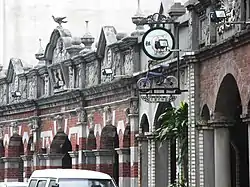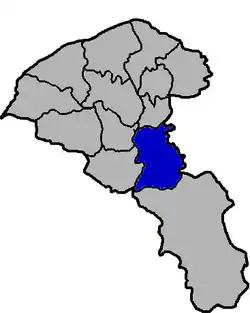Daxi District
Daxi District (Chinese: 大溪區; Hanyu Pinyin: Dàxī Qū; Tongyong Pinyin: Dàsi Cyu; Wade–Giles: Ta⁴-hsi¹ Chʻü¹), formerly known as Daxi Township (Chinese: 大溪鎮; Hanyu Pinyin: Dàxī Zhèn; Tongyong Pinyin: Dàsi Jhèn; Wade–Giles: Ta⁴-hsi¹ Chên⁴), is a district in eastern Taoyuan City, Taiwan. In March 2012, it was named one of the Top 10 Small Tourist Towns by the Tourism Bureau of Taiwan.[1]
Daxi
大溪區 Daikei | |
|---|---|
| Daxi District | |
 | |
 Daxi District in Taoyuan City | |
| Coordinates: 24°52′50.2″N 121°17′13.5″E | |
| Country | Taiwan |
| Municipality | Taoyuan City |
| Government | |
| • Mayor | Chen,Jia-cong |
| Area | |
| • Total | 40.6 sq mi (105.1 km2) |
| Population (February 2023) | |
| • Total | 94,475 |
| Website | www |



History
The Daxi area was occupied for several thousand years by the Atayal people. The Atayal called the local river (modern-day Dahan Creek) Takoham in their native Austronesian language. This gave rise to similar names such as Toa-kho-ham[2] (Chinese: 大嵙陷; Pe̍h-ōe-jī: Tōa-kho͘-hām; also 大嵙崁; Tōa-kho͘-khàm)[3] in Hokkien and Taikokan[4] in Japanese via transliteration.
Eighteenth-century Han settlement in the Taipei Basin led many Atayal families to relocate upriver, though some Atayal stayed and mingled with the newcomers. The settlement later became an important trading post in the 19th century.
In 1803, open fighting broke out between two rival factions of Han settlers in Taipei, and many refugees fled south for safety. Among the refugees was the Lin Ben Yuan Family, one of the wealthiest clans in Taiwan at the time. The clan settled in Takoham, invested its fortunes in the settlement and brought prosperity to the whole region. Due to its strategic location and the investments made by the Lin clan, Takoham became the center of trading and transportation between Taipei and the south. Goods would arrive here to be transported to Taipei via Dahan river, and many traders opened their shops in the area; some of the shops still exist today in the old town section.
When the North-South Railway that bypasses the Takoham settlement was completed in 1909, the importance of river trade declined. Takoham lost its significance in North-South transportation, and is no longer a significant trading port. On the other hand, it became famous for the production of wooden furniture. In 1920, the Japanese government renamed this area 大溪 ("big creek"), pronounced Daikei in Japanese and Dàxī in Mandarin, which was administered under Shinchiku Prefecture.
Daxi dried tofu is a popular ingredient in Taiwanese cuisine. Daxi is also home to the mausoleums of two Kuomintang leaders: the late president Chiang Kai-shek in nearby Cihu and his son Chiang Ching-kuo in Touliao.
Administrative divisions
Xinghe, Furen, Tianxin, Yixin, Yide, Yuemei, Yongfu, Kangan, Yihe, Meihua, Fuan, Fuxing, Xinfeng, Zhongxin, Ruixing, Renshan, Qiaoai, Renyi, Renhe, Renai, Renwu, Renwen, Nanxing, Yuanlin, Guangming, Ruiyuan and Sanyuan Village.
Economy
The headquarters of Kimlan Foods is located in Daxi.[5]
Tourist attractions
- A-mu Ping
- Cihu Mausoleum
- Cihur
- Daxi Bridge
- Daxi Health Herb Garden
- Daxi Old Street
- Daxi Wood Art Ecomuseum
- Daxi Wude Hall
- Furen Temple
- Hoping Old Street
- Jien's Archaic Mansion
- Kuanyin Temple at Lotus Seat Mountain
- Lee Teng-fan's Ancient Residence
- Mei-hwa Spinning Top Museum
- Presbyterian Church of Daxi
- Puzi Temple
- Saint Franciscan Catholic Church
- Taoliao Lake
- Touliao Mausoleum
- Ximen Reservoir
- Zaiming Temple
- Zhongshan Road
- Zhongzheng Park
Transportation
Bus

- Daxi Bus Station of Taoyuan Bus have most of routes to Daxi, and 5096 route from Taoyuan Station and 5098 route from Zhongli Station send every 10 to 20 minutes.
- Taiwan Tourist Shuttle Routes have Daxi Express to Daxi[7][6] and Xiaowulai Route also passes through Daxi.[8]
- Ropo Bus have 710 Express from Yongning Station of Taipei Metro to Daxi.
Road
Daxi is served by National Highway No. 3 and Provincial Highway No. 66.
Notable natives
- Fong Fei-fei, former singer and actress
See also
References
- Wong, Maggie Hiufu (2012-03-30). "Taiwan names its 10 top small tourist towns". CNN Go. Archived from the original on 2012-04-02. Retrieved 2012-03-31.
- Campbell (1896), map.
- "Entry #40028 (大嵙崁)". 臺灣閩南語常用詞辭典 [Dictionary of Frequently-Used Taiwan Minnan]. (in Chinese and Hokkien). Ministry of Education, R.O.C. 2011.
- Davidson (1903), map.
- "d_2.gif." Kimlan Foods. Retrieved on November 9, 2012. "No. 236, Jieshoo Road, Dasi, Taoyuan, Taiwan"
- "Oops!! 您輸入的網址不存在喔!!". 桃園觀光導覽網.
- "台灣好行旅遊服務網-好行路線-內容".
- "台灣好行旅遊服務網-好行路線-內容".
Bibliography
- Campbell, William (1896). "The island of Formosa: Its past and future". Scottish Geographical Magazine. 12 (8): 385–399. doi:10.1080/00369229608732903.
- Davidson, James W. (1903). The Island of Formosa, Past and Present : history, people, resources, and commercial prospects : tea, camphor, sugar, gold, coal, sulphur, economical plants, and other productions. London and New York: Macmillan & co. OL 6931635M.
External links
 Media related to Daxi District, Taoyuan at Wikimedia Commons
Media related to Daxi District, Taoyuan at Wikimedia Commons- Dasi Old Streets
- Daxi Town International Information System (in English)